As women in this world, we’ve got issues — and so EW’s first Women’s Issue is born. We don’t want to leave topics like reproductive rights, workplace equality and representation in the media to be covered in this March section alone; they deserve timely attention year-round. (Call us!) Instead we have profiles of local women on our radar. We applaud women who stand out, love them or hate them, so here are some conspicuous local women. — Shannon Finnell
Photographs by Todd Cooper.
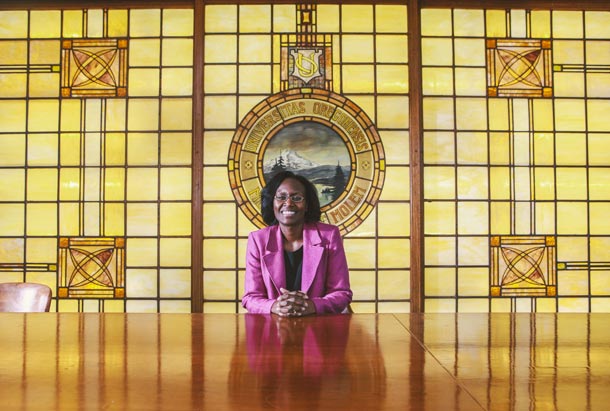
Yvette Alex-Assensoh Looking to empower people
After 18 years teaching, doing research and serving as the dean of Indiana University’s Office for Women’s Affairs, Dr. Yvette Alex-Assensoh was drawn to the University of Oregon by a desire “to open doors to people with a variety of backgrounds.” Alex-Assensoh serves as vice president of the University of Oregon’s Equity and Inclusion Department.
“I think the bottom line of the work that I do is about empowering people,” she says. “And by empowering people in the state of Oregon, we empower and enhance the standing of this state. In turn, as we do that, we empower America as a global entity.”
A political scientist, licensed attorney and registered family mediator, Alex-Assensoh has had a hand in the creation of five books, through authoring, co-authoring or editing. Her latest book, Immigrants and American Racial Politics in the Early 19th Century, is “about the impact of immigration in changing the way that we engage politically in America, especially around issues of voting and public policy.”
Intrigued by how a person’s racial background, language, gender and class — all aspects of inclusion — led to power, her initial studies at Indiana University were related to the urban underclass, specifically trying to uncover how being a social outcast and social marginalization relate to the political world.
“If we have people living in these underclass neighborhoods, how does that affect how they see themselves as political actors?” she asks. To help answer that question, she received funding from the National Science Foundation, the Social Science Research Council and the Ford Foundation. She then surveyed white and black underclass neighborhoods to learn how the people inhabiting these areas behaved.
“The similarities were just amazing,” she says, “that whites and blacks who previous researchers discussed as really separate political animals when it came to voting, and when it came to political attitudes, expressed themselves and behaved similarly in the context in which they lived.”
Her work has been inspiring but that doesn’t mean it has been all smooth sailing for her office, with a cloud of controversy hovering over Johnson Hall. On Jan. 7, protesters, many of whom were Native American, stood outside voicing their displeasure regarding two related matters: the recent dismissal of former vice presidents Emilio Hernandez, Carla Gary and Tom Ball and not being included in the restructuring process. The R-G reported that the office didn’t consult with Oregon’s nine tribes prior to making the changes, which upset much of the Native American population. The protesters desired to meet with Alex-Assensoh, but she was unavailable at the time. Alex-Assensoh declined to comment on the topic.
Still, Alex-Assensoh says her ultimate goal as vice president is to help put conflicts to rest and make all feel welcome. “People who were warring for whatever reason can be compelled to create a new reality where both parties live amicably and where everyone has an opportunity to benefit and thrive,” she says. — Nick Poust

Mercedes Russell Powering Forward
Springfield High School is saying goodbye to the number one women’s basketball recruit in the nation, as determined by both ESPN and Gatorade, as she finishes her final year and prepares for college life and a competitive NCAA program.
At 6’ 5”, Mercedes Russell is a presence both on and off the court. Next season, the Springfield Millers’ power forward is transplanting her roots across the country to play for the University of Tennessee Lady Volunteers, one of the top collegiate women’s basketball programs in the country. “I’m excited. I’ve lived here all my life so it’ll be different for me and I’ll get away from the West Coast,” Russell says. “I’m ready for a change.”
The Tennessee program is a prominent one to say the least, having been a contender in every single NCAA Women’s Division I Championship tournament since the early ’80s. Russell will join an entire cast of skilled players.
“What separates her from a lot of other players is her work ethic and how much she dedicates herself to the game,” says Springfield Head Coach Bill Wagner. “I just see her taking off and I think she’ll be a game changer in the women’s game.”
This past season, the Millers rounded out the season with a 24-4 overall record, finishing second in the state. During a 5A semifinal game against Hermiston, Russell recorded a triple-double, with 32 points, 14 rebounds and 12 blocks.
Wagner says Russell has made an impression beyond the court. “Mercedes is a person of such a high standard of character,” he adds. “Here at school she’s so well liked just because of how she interacts with people.”
Russell says that she loves the competition of playing, especially in front of a crowd. “Ever since I was little I’ve looked up to Candace Parker and her game and how hard she works,” she says. Parker plays for the WNBA’s Los Angeles Sparks.
The excitement of leaving for college and the NCAA intensifies as the date draws near, but Russell says she’ll miss her hometown. “It’s bittersweet,” she says. “I’m excited to be done and get ready to leave for college, but I’m also sad that I’m leaving all of my friends.” — Kevin Piaskowski
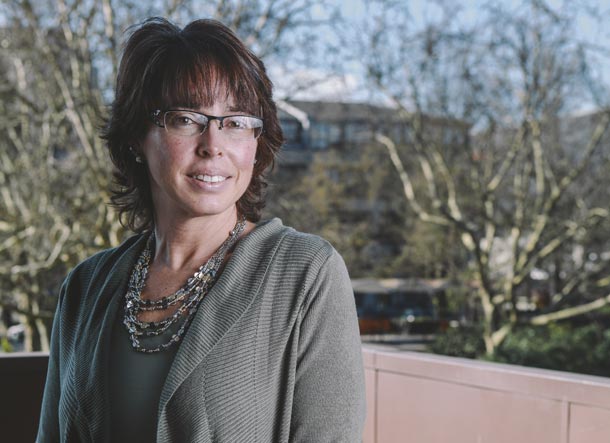
Liane Richardson Administrating the county
Liane Richardson is one of only two female county administrators in Oregon, according to Anne Marie Levis, Lane County’s public information officer. Levis says Richardson was out of town and unavailable for an interview with EW, but she answered questions via email.
Richardson, in a document sent through Levis, writes that as a child she dreamed of different professions — doctor, veterinarian “and finally as an advocate for those who didn’t have a voice.” Richardson says that in high school, “I learned what attorneys could do to help provide that voice, both [for] victims of crime and the underrepresented, and that sparked my interest in law.”
Richardson started at Lane County as an attorney before becoming acting, and then “permanent,” county administrator. In the past she has worked in the Lane County District Attorney (DA)’s office, been chief deputy district attorney in Benton County and assistant dean for student affairs at the UO School of Law — and she won Mrs. Eugene International 2007 and competed in the Mrs. Oregon International beauty pageant that year.
She writes, “During my time with the DA’s office, I was named DUII prosecutor of the year and the whole experience really opened up my eyes to the limitless potential to make a difference at the county level.”
She adds, “While I’ve worked with the law and government in several different capacities, I feel like they’ve all helped prepare me for my current role and they’ve all helped me pursue and maintain my goal of helping those who need help.”
Richardson has been surrounded by controversy since her official appointment as county administrator in May 2011. Progressive commissioner Pete Sorenson and former commissioner Rob Handy voted against her appointment. Sorenson said at the time that he felt there should have been an open recruitment process for the position, which paid $149,200 plus $71,400 in other compensation.
Handy and Sorenson’s no votes on her hiring were cited by Richardson in complaints later in 2011 in which she alleged that they were retaliating against her. Those complaints were determined to be unfounded by an investigator, who pointed out that voting on hiring was part of the commissioners’ jobs. The investigation cost the county more than $20,000. One of the complaints was that Handy’s “body language and facial expressions” were “demonstrating retaliatory behavior toward Ms. Richardson in board meetings.” The investigator found no evidence of that in his finding of fact.
A 2006 Corvallis Gazette Times article said that Richardson accused a judge, whom she argued in front of as deputy DA in Benton County, of being “disdainful” of her in court and showing it through “eye-rolling and impatient sighs.” Richardson resigned from her position, she said in the article, because of the animosity she felt the judge directed toward her.
The most recent controversies surrounding Richardson include clashing with activists when she closed down the county “free speech” plaza to protesters who were working to call attention to the plight of Eugene’s homeless. Then came the proposal in January to increase her base salary to $175,656 with a possible increase to $221,874.
The Human Resources Department said that the salary increase was needed for “a competitive salary range to recruit and retain professional leadership skills.” Richardson tabled the compensation for a later date, after a maelstrom of protests about raising salaries during a time when the county’s poor finances have led to letting criminals out of jail due to a lack of jail beds.
In December 2012, former county attorney Marc Kardell wrote in a tort-claim notice letter that he was fired after he raised concerns about misuse of county funds and that Richardson’s actions were causing “a multitude of problems” within the county. Kardell also alleged possible age discrimination in his firing, a concern that has been echoed by others concerned about terminations at the county under Richardson’s tenure.
Levis calls Richardson “humble,” saying she thinks people don’t really know Richardson and “judge her harder as a woman.”
When asked about the controversies, Richardson responds that her position “carries with it a lot of responsibility; to the board, to young women who are looking to pursue leadership positions and of course, to the people of Lane County” and writes though “often times there are no easy answers” she tries to make decisions that represent “all groups of people equally and fairly.”
She writes that despite seeing herself as a “tomboy” she competed in the Mrs. Oregon International Pageant “to see if in fact it was really as demeaning to women as I had thought back when I was younger” and also because she “didn’t see a lot of representation from individuals with my demeanor, background and goals.” She writes that her experience didn’t feel demeaning or insulting to women.
When asked where she sees herself in 10 years, Richardson responds, “Hopefully still at the county, having worked with our board, our employees and the community to bring the county back to a place where we can provide all of the services our residents need at a level that is reasonable.” — Camilla Mortensen
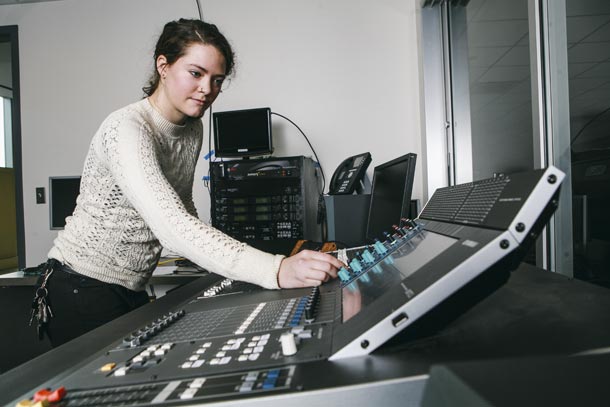
Chelsea Joyce Sounding off
It was somewhere between New Mexico and New York that Chelsea Joyce decided to stop wearing a bra. The 26-year-old sound engineer was midway through 2012’s Warped Tour, and she was sleeping, eating and working 14-hour days alongside 12 dudes on a bus, as they rolled from city to city, parking lot to parking lot, doing sound for the 50-day rock tour with 41 shows.
“It kind of sucked because when I got off work, and I was exhausted, I felt like I still needed to keep my sports bra on,” Joyce says, laughing. She worked as the “patch master,” the person who sets up mics, wires the stage and the PA system. “About halfway through, I was like, ‘Screw this! … I don’t care what I look like and screw them if they care.’”
After eight years (on-and-off) in the sound business — working at McDonald Theatre, Cuthbert, Sam Bond’s, WOW Hall, Matthew Knight Arena and festivals — Joyce shrugs these kinds of moments off. She says there are not many women in the field because of a self-fulfilling prophecy fueled by the intimidation of a male-dominated industry. She’s had to deal with come-ons and low expectations, but is convinced that a quick wit is the best defense. “My skin has gotten so, so much thicker because of it,” she says. “It’s pretty awesome.”
But like anything worth living your life for, it was a journey to get to that thick-skinned place. Joyce first fell in love with the music scene going to punk rock shows as a teenager in Bend. By 18, she knew she wanted to study sound and headed to Full Sail University in Florida, where she spent 13 “crazy” months studying sound, lighting, video and sports broadcasting. After earning her associate’s degree, Joyce found herself across the globe.
“I left for a trip for what I thought was going to be three weeks to Israel,” she says. “I canceled my plane ticket back home and ended up traveling around for 10 months.” Joyce backpacked from Israel to Greece, Turkey to Egypt and, finally, to India. “I changed a lot because I learned how to be independent. I proved to myself I could be.”
Upon returning stateside, Joyce earned her degree in sociology at the UO, and returned to sound, working up to 60 hours a week. She finds that “sociology and sound relate in a lot of ways,” because of working with diverse folks in a dangerous job with heavy lifting and high voltage where “people are a liability.”
Now, Joyce’s days are filled with soundboards, sound checks, sub-snakes and XLRs. But the confidence she gained through travel may be her most valuable asset. “When I’m dealing with a band and I seem nervous, they don’t have faith in my abilities. Especially as a woman too,” she says. “A lot of bands don’t know what to think because they don’t see a woman much behind the board. Sometimes it works to my favor and they’re like ‘Wow, she must really know what she’s doing,’ and sometimes people doubt me because of it until I prove that I can do it.”
Although Joyce loves working in sound, because it’s “never-ending learning,” she eventually wants to stage or tour manage. She’s hopeful for more women in the field. “In the past month,” she says, “there have been two girls who have come up to me while I’m mixing and said ‘Hey, I’m studying sound. Can I shadow you some time? It’s great to see a woman doing it.’” — Alex Notman
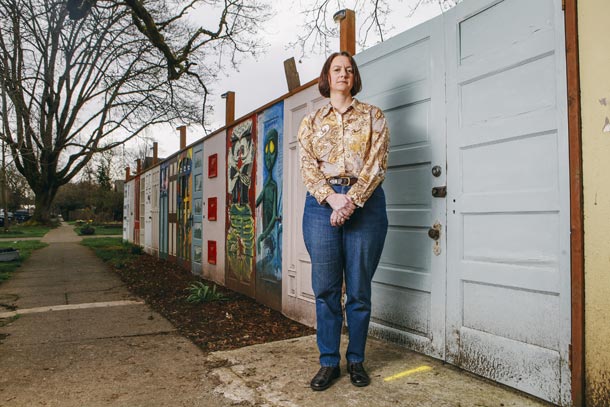
Claire Syrett Representing the Whiteaker
It’s a long way from the conservative Republican enclave of Ranchos Palos Verdes, Calif., to the Whiteaker. And that’s what City Councilor Claire Syrett, who represents Eugene’s Ward 7, likes about living there. “It’s very alive, and it’s very connected with humanity that’s both good and bad,” she says.
Still, Syrett says she’s had to stifle a laugh when she’s heard others describe it as Eugene’s “dangerous” neighborhood. “Compared to some neighborhoods we’d seen and avoided in LA, it had a lot of charm,” she says of seeing it for the first time. “Maybe it was more dangerous in the past in terms of actual person-to-person crime, but I have to say that I’ve never felt unsafe in my neighborhood.”
Before moving to Eugene about 20 years ago, Syrett says most of her political thinking was on the national level, but in Eugene, a much more personal relationship with the community and its politics got her thinking local.
After talking with friends about a potential run for office, Syrett asked Mayor Kitty Piercy for advice, and Piercy suggested connecting with EMERGE, a group that prepares Democrat women for elections. “At the time she recommended that I do that, I was actually a Green Party member,” Syrett says, “so I chose to change my party affiliation to Democrat so I could join that, but I’ve never been a strong partisan one way or the other.”
Now that she’s in office, Syrett serves on the Police Commission, Human Services Committee and Lane Regional Air Protection Agency, but her long-term goal, which she is just beginning to research, is to find ways to increase the average wage in Lane County. “We are consistently below Oregon, and Oregon is consistently below the rest of the U.S., in terms of our average income, yet our housing costs are not that much lower than Portland’s,” she says. “So we find ourselves in this bind, with people who have full-time jobs and are struggling to meet their basic housing costs.”
Syrett says that she is a feminist, although she struggled with the label when she heard it framed as women needing special treatment. “I don’t really see it that way so much as we have been treated differently by society,” she says. “I think feminism means acknowledging that women deserve and should have a place at the table equal to men.”
Buffy (of vampire slayer fame) is a feminist hero to Syrett because of “that idea of embracing female power and taking control of one’s own destiny,” she says. “More locally, one of my heroes was a local SEIU organizer Lucy Lahr, who was, unfortunately, killed in a traffic accident. She was the person who helped me become an organizer and gave me lots of support.”
In Eugene, Syrett has, among other things, worked at Jerry’s, been an organizer (and later the regional field director) for the ACLU and is now executive director of Lane Coalition for Healthy Active Youth, working to prevent childhood obesity. With the ACLU, she worked against Eugene’s downtown exclusion zone, prepared for reproductive rights fights that didn’t materialize and got started on some anti-death penalty work.
Syrett and her husband, Davey Wendt (the chocolatier at Rye), enjoy birding and hanging out with their two dogs in the Whiteaker. “Moving here was kind of a leap of faith,” she says, but it paid off. “I think we both really found community here that we love and enjoy.” — Shannon Finnell
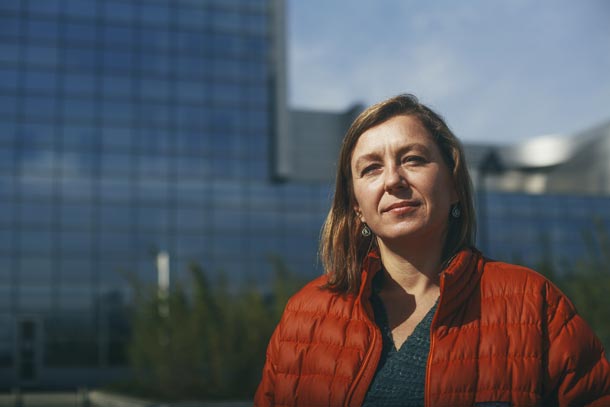
Lauren Regan Fighting for your rights
Lauren Regan of the Civil Liberties Defense Center (CLDC) recently defended her 800th activist. From forest activists and tar sands blockaders to the mentally ill, Regan has stood up for the rights of the outspoken and the disenfranchised from Oregon to Texas.
Regan knew she was going to be an attorney by the time she was 10 years old. At first she thought she was going to be a vet, she says, but that would involve blood, guts and sometimes hurting animals. “I wanted to be their lawyer and save them.”
Regan says, “I announced to my family that I would be an animal rights lawyer.” She knew, in some way, lawyers saved people and animals. She grew up in upstate New York, but came to the University of Oregon for law school because the Northwest was where she wanted to be. After working for a small public interest environmental law firm for five years, “I decided to throw out my own shingle.”
She has no kids, citing the population explosion, and that childlessness allows her to live
simply and flexibly “and do what I can do to defend the planet and make the world a better
place and instill compassion in the way we live upon the Earth.”
The impetus to found the nonprofit CLDC came from the era after the Seattle World Trade Organization protests when there was a lot of environmental activism going on, but there really weren’t any lawyers specializing in defending activists, she says. “You had a choice of a public defender or a pro-bono lawyer doing criminal defense.” The stakes got higher and someone familiar with the unique issues of politically active clients was needed. “Environmental law, activist defense and police misconduct, it’s like one-stop shopping,” Regan says of the CLDC.
Regan founded the CLDC in December 2003, and in addition to legal defense work, she and the organization put on “know your rights” trainings. While 800 activists in 10 years might sound like a lot of work, “when you like what you do, it doesn’t seem tiresome,” she says.
Regan is aided by her board of directors and other attorneys doing work pro-bono, she says, and she’s also tried to duplicate the CLDC by training law clerks and mentoring young attorneys — about 100 in the past 10 years. Mentee Rebecca Smith is about to file her first police misconduct case in Missoula, Mont., and Regan says CLDC has tried to spread its work across the country.
Regan says that some of her cases have been systemic fixes that challenge laws and get them eradicated from the books so no other activists will be subjected to them. She cites the Josh Schlossberg case in Eugene: She successfully argued in federal court that a Eugene police officer, Bill Solesbee, violated Schlossberg’s Fourth Amendment rights by searching the contents of his camera without a warrant. “Not only did it set a pretty national precedent for what copwatchers are allowed to do, it also dealt with a problematic cop in our community,” she says.
Her work has met with some backlash, but “not as much as you would expect.” She sometimes has difficulties flying, and after successfully defending forest activists in rural Gold Beach, Ore., the sheriffs escorted her to the county line when she left, she laughs. “But it’s nothing that would ever deter me from wanting to do more and more.”
Regan says her passion for defending activists and marginalized communities is part of her success. The government pays people 40 hours a week to do their jobs, she says, “but we would do this work for free and work 90 to their 40, so despite the billions of dollars the feds put in to destroy those movements, we are not only right, we are more committed.”
Still, her parents ask her, “Couldn’t you just do wills or divorces? Do you have to sue FBI agents?” — Camilla Mortensen